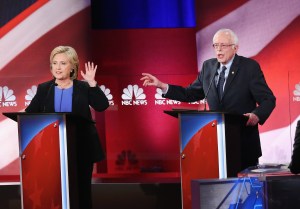Vermont Sen. Bernie Sanders on Saturday vowed to continue his fight for the Democratic nomination beyond the primary season, telling reporters at a news conference in Los Angeles that he plans to go after Hillary Clinton’s superdelegates.

Clinton currently has 2,313 total delegates — 1,769 of which are pledged and 544 of which are superdelegates — and she is expected to cross the 2,383-delgate threshold in the next few days to clinch the nomination. But Sanders, who has 1,501 pledged delegates and only 46 superdelegates, says he can still woo enough of her superdelegates between now and the Democratic convention in July to swing the nomination his way.
Pledged delegates emerge from primaries and caucuses, while superdelegates are party leaders — elected officials and former ones who have individually committed to a candidate. It would be unprecedented for the number of superdelegates Sanders needs to switch allegiances, and, like Clinton this year, then-Sen. Barack Obama entered the 2008 convention without a majority of pledged delegates.
“The media is in error when they lump superdelegates with pledged delegates. Pledged delegates are real,” Sanders said. “Hillary Clinton will not have the requisite number of pledged delegates to win the Democratic nomination at the end of the nominating process on June 14. Won’t happen. She will be dependent on superdelegates.”
He vowed, “The Democratic National Convention will be a contested convention.”
The Vermont senator accused the media of lumping together pledged delegates and superdelegates, noting that superdelegates don’t formally cast their votes until the convention in late July, or, as Sanders put it, “six long weeks from today.”
Sanders, however, acknowledged that it’s unlikely he’ll be able to turn around his fortunes.
“We understand that we have a steep climb,” Sanders said. “I’m not here to tell you that tomorrow we’re going to flip 300 superdelegates. You don’t hear me say that. But I am saying we are going to make the case.”
The Virgin Islands holds its Democratic caucuses later on Saturday and Puerto Rico holds its primary on Sunday, when Clinton will likely get her earliest opportunity to clinch the nomination. California, Montana, New Jersey, New Mexico, North Dakota and South Dakota hold their primaries on Tuesday, and Washington, D.C., holds the final nominating contest of the primary season on June 14.
Superdelegate process under scrutiny
For months, Sanders and his campaign have railed against how the Democratic National Committee and Chairwoman Debbie Wasserman Schultz have handled the primary process, claiming it has helped Clinton with debates held on Saturday nights, closed primaries in major states such as New York, and the use of superdelegates.
“That is called an anointment process, not a democratic process with a small or large d,” Sanders said on Saturday.
He was joined in his criticism of the superdelegate process on Saturday by fellow progressive stalwart Elizabeth Warren, who said at the Massachusetts Democratic State Convention that she “doesn’t believe in superdelegates” — even though as a senator, she is one.
“I don’t think that superdelegates ought to sway the election,” the Massachusetts senator said before giving a talk focused on income equality, MassLive.com reported.















